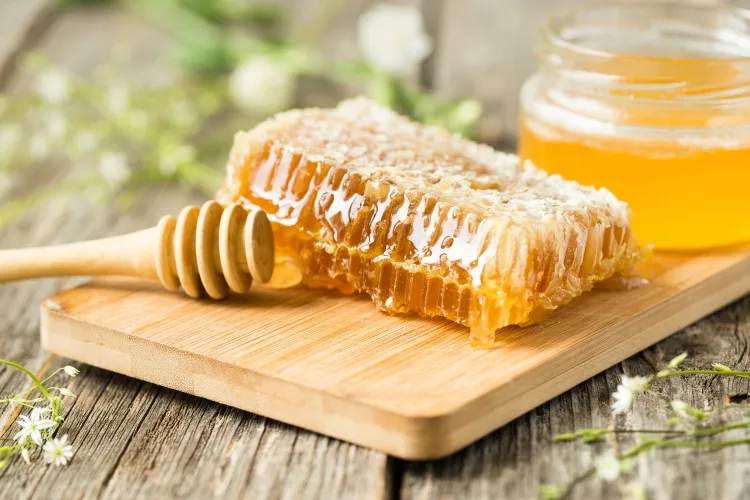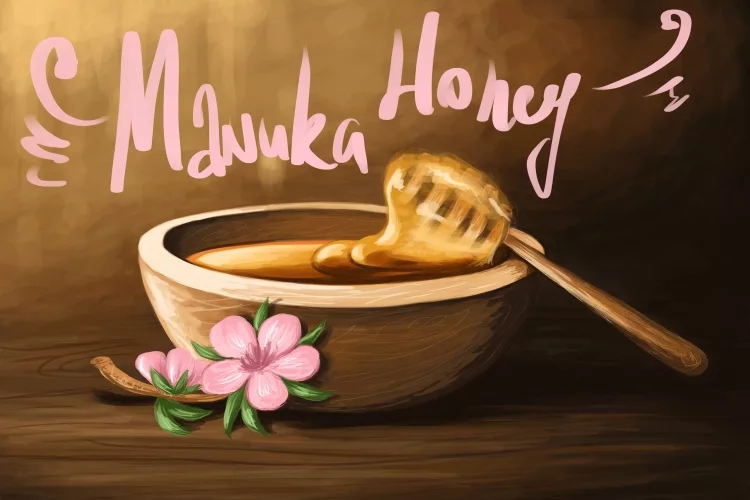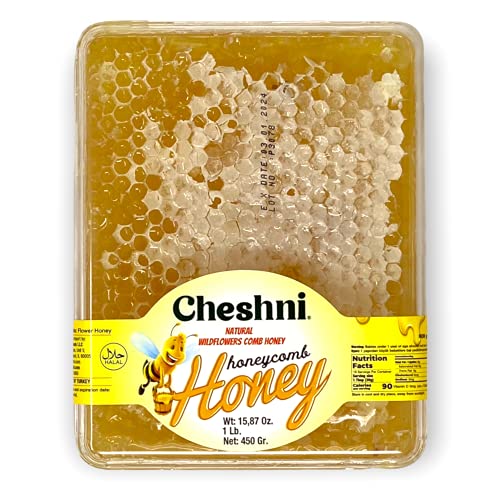reviewed by Truman Perkins
The general notion is that Raw honey provides the most health benefits compared to other forms of honey. But is that true? Read on to find out!
Honey is delicious there's no doubt about that. And unless you are allergic to the tasty substance, there is every chance you love it as a treat. I mean, who doesn't like honey right?
For honey enthusiasts, the sweet golden-colored syrupy liquid produced by honeybees is more than just a treat. Some refer to it as liquid gold. This isn't just because of its taste. It is also because of its history and medicinal impact which of course they know since they are strong advocates of people taking honey.
Honey has been around for about 8000 years according to medical research. There is a wide variety of them and it can be hard to differentiate between them all at times. Most honey available right now in supermarkets and online stores is most pasteurized and contains sugar and other additives. One a few raw honey bottles are often put up for sale and they are rare to come by.
This then begs the question, what type of honey is more beneficial? Why is processed honey a lot more available to pick up on supermarket shelves?
Contents
In this post, we will look at the differences, if any, between the honey bees store as food (raw honey) and the processed ones that are readily available in the supermarket today. This would detail all you need to know about their benefits and associated health risks.

Raw honey is honey made by bees and extracted directly from the honeycomb. This type of honey is only filtered while extracting to remove debris present in the beehive or honeycomb such as pollen, parts of dead bees, and even beeswax.
Raw honey is not pasteurized and as a result, might appear cloudy or opaque. Even with that, it is safe and okay to consume.
However, it is not often that you come across this honey, especially while trying to buy one in a local supermarket. Most of the people that started eating honey started with regular honey
Regular Honey is essentially pasteurized raw honey. Through the application of intense heat (during the pasteurization process), the honey's appearance quickly changes from opaque and cloudy to clear and smooth. When honey is subject to pasteurization, the percentage of antioxidants and nutrients present in it significantly reduces.
Regular honey generally lasts longer than raw honey since they do not react to yeast cells that can affect the taste of honey. Raw honey, on the other hand, has a really short shelf life which mostly leads to a change in taste after a period.
Raw honey is essentially honey in its natural form. It is unfermented and has not yet undergone any pasteurization process in any form.
As you would soon understand from our detailed explanation of Manuka honey, raw honey is simply unprocessed honey made from the nectar of any plant by bees. Since Manuka honey is not pasteurized, it is essentially a form of Raw honey.
Since Raw Honey is available in a variety of forms, you would not have difficulty finding it. All you have to remember is that any honey extracted from a plant's nectar that is not processed is raw!
That said, Raw honey comes with the distinct medicinal and healing properties of the specific plant the bees extracted the base nectar from. For instance, honey extracted from the Manuka plant would have high antibacterial properties.
Raw honey in general has a low-calorie level. And while they might not seem as hygienic as pasteurized honey, it is pretty safe to consume them.
In this case, we talk about the different issues you might encounter if you do purchase a bottle of Raw honey.
Unlike regular honey that has already undergone pasteurization, Raw honey is unfermented. Only the impurities like beeswax, dead bee bodies, honeycomb fragments are sieved out. As a result, yeast can easily grow in the Raw honey if kept for an extended period.
Raw honey is not as attractive as processed or regular honey. The color often looks opaque and cloudy. Sometimes it even looks rough.
Since only a strainer is used when extracting Raw honey from its honeycomb, there are bound to be impurities present in the honey.

It is common knowledge that most of the honey we eat comes from nectar extracted from plants (usually from the flowers on a plant). The nectar extraction is carried out by bees.
The bee-honey-making process involves the bees sucking in the nectar, then flying back to disgorge it in the honeycomb of their hive. The honeycomb acts as a storage unit for the nectar. The stored nectar in the honeycomb then breaks down into sugar complexes after a period. This is the process involved in the formation of honey.
Manuka honey is extracted and made the same way. The only thing unique difference is that the nectar used in making Manuka honey is extracted from the Manuka plant. As a result, the Manuka honey always has a slightly darker color than the traditional golden or amber honey color. Manuka honey also tends to be a bit thicker than normal honey.
However, Manuka honey is pretty rare and expensive. This is because the manuka plant does not grow in every region in the world. It only grows in Australia and New Zealand.
But the plant is most popular in New Zealand. Some natives in the country even refer to it as the New Zealand Tea Tree.
In Australia, manuka honey is also extracted from certain plants asides from the Manuka plant. This is quite interesting since it essentially translates to more Manuka honey being readily available in Australia. The nectar for the honey is extracted from Golden Tea Tree and Jellybush Tree alongside the Manuka plant.
Due to the rising popularity of Manuka honey when it was first discovered, much research was carried out on it. The results were quite interesting and surprising, to say the least. Honey extracted from the nectar of Manuka plants was found to have powerful fighting resistance to bacteria. This makes it more useful since honey in general were often used for healing over time since its discovery.
Asides from taking honey as internal medicine, people also use honey, in general, for hair and skin therapy. Due to its powerful fighting resistance to bacteria, Manuka honey serves as a powerful antibacterial agent.
Some of the popular chemicals and compounds you will find in Manuka honey includes methylglyoxal, concentrated Leptospira, etc.

The uniqueness of Manuka honey cannot be overemphasized. As a result, there is even a grading system that helps users know the quality of honey they are purchasing. This is especially useful since only two countries produce it.
To calculate the UMF of particular manuka honey, its DHA, Leptosperin, and Methylglyoxal are taken into consideration.
The rating ranges from 7 to 16+. Any jar of honey with 16+ UMF means the honey is of superior quality and comes with extensive health benefits.
Smearing Manuka honey on a tropical cut, bug bite, skin rash, burn, itchy spot, etc. is an alternate but effective way of healing the injury. This is mostly due to the honey having incredible antibacterial properties.
When applied, it cleanses the wound and stops the infection from setting in. It then allows the body to naturally heal the wound or injury while speeding up the healing process.
With this, you don't even need to buy antibiotics or antibacterial cream to treat injuries as such.
Another interesting benefit of Manuka honey is in its ability to rid you of acne. All you have to do is apply enough of the honey on your face! It would also help repair dry skins during the winter season. Depending on the frequency of use, it can also fade, to an extent, wrinkles and age lines.
During winter or cold weather, a spoon of honey alongside warm milk, water or tea would help with the cold.
5. Manuka Honey enhances the immune and digestive system when ingested.
In case you didn't know, most hair products today have honey as one of their ingredients. Even some skincare products have honey as their base ingredient. This just goes to show how useful honey is.
A mixture of Manuka honey and coconut oil would help you treat dandruff. When massaged into your hair scalp, it adds essential nutrients to your hair. Thus making it healthier and softer.
This is the same as taking Manuka honey with tea or milk or water. Honey is capable of helping the body generate heat. When you eat it in the winter, you can be sure you won't feel the cold as much as if you didn't.
8. Some Pharmaceutical companies, especially in New Zealand, use Manuka honey when making medicine for sore throats.
1. It is extremely expensive due to its high demand. Coupled that with the fact that only New Zealand and Australia produce Manuka honey, its availability is very low.
The fastest way to get it is to order it from an international marketplace that can ship to your country.
2. Manuka honey is thicker and denser than your regular honey. Spooning it can be a bit hard. This means it is harder to spread it on bread, pancakes, or other dishes that require a layer of honey.

To be very honest, it is very difficult to pinpoint which of these two types of honey is superior or better. This is because they both share the same qualities, properties, and health benefits. As a result, we will be comparing the two side by side based on different criteria. After a read-through, you can then decide which type of honey offers you the best benefit.
Because Raw honey is available in various forms, there is no specific research work that comes to mind.
Manuka honey, on the other hand, has been subjected to a lot of tests, especially its antibacterial properties. The results have then been left to a rating system being set up to help buyers understand how pure the health benefits of the Manuka honey they are buying are.
Raw honey on the other hand isn't rare. If a particular type of raw honey is unavailable on the Supermarket shelf, you can easily pick up another type.
Because of the high medicinal benefits of Manuka honey, some pharmaceutical companies use it as a base ingredient for sore throat medicines. Some medical practitioners even recommend taking Manuka honey after undergoing chemotherapy.
The medicinal benefits of raw honey on the other hand mostly depend on the characteristics of the plant it was extracted from.

Sadly no. While most of the Raw honey available on the market today are organic, a good number of them are not. Even most organic honey has undergone some form of processing.
Most honey-making farms have a label that registers them as legitimate organic honey producers. The label indicates that such a farm follows all the stipulated guidelines of the USDA (United States Department of Agriculture).
Hence, if you want to best possible raw honey, one that still contains its natural beneficial ingredients, you need to make sure the jar has the USDA label on it.
We already discussed Raw and Manuka honey in this article. However, there are still several different kinds of honey available. Each comes with unique characteristics and health benefits. Here are the three most common ones:

As with any raw honey, it is possible to process or pasteurize Manuka honey. However, it is rarely ever pasteurized. This is down to the unique but amazing health benefits it offers. That, coupled with the fact that it is extremely hard to produce in large quantities since Manuka bush only grows in two countries.
Without considering all the above, there is also the issue of killing some of the medicinal agents present in Manuka honey while pasteurizing, This is the implication of the application of heat in other to kill yeast and other bacteria that might be present in the honey. By doing this, the major selling point of the honey is removed.
Hence, Manuka honey is mostly available raw!

Yes, very possible.
Naturally, honey would remain and taste as it was when originally harvested from the honeycomb. However, this depends on how it is stored. If the honey is exposed to the environment for a prolonged period, it would go bad.
The science behind it is that water and humidity is a breeding space for bacteria. When honey is exposed to the air and not properly stored, bacteria can easily survive in such an environment.

There is a lot of debate and controversy when it comes to answering this question. I mean, vegans have a lot of rules in terms of what they eat.
The only way to look at this question is by considering how honey is harvested. Bees are not forced to make honey. They make it on their own which is why they are kept free-range on bee farms. Also while harvesting honey, the bees are not harmed in any way. As a result, some vegans eat it.
However, some vegans consider honey to be a direct by-product of bees since it contains enzymes that are only found in bees and beehives. They also believe that by taking this by-product without the permission of the bees, it is not appropriate to eat.
Hence, the only answer is that it ultimately depends on your personal preference as a vegan on whether or not you want to consume honey.
Yes, they do. That is one of the reasons they taste sweet of course! Your typical raw honey comprises about 80% sugar. The sugar present is a lot similar to the normal table sugar we know.
Considering raw honey contain 80% sugar, you can then imagine the sugar content of regular honey. Regular honey often contains other additives including sugar and preservatives.

Well, Yes and No!v
Children over the age of 18 months can eat as much honey as they want - be it Raw or regular honey. However, honey is not safe for children under 18 months as their digestive system is not well developed to digest it.
When kids of 15 months or below consume honey without having a digestive tract strong enough to digest it, tiny bacteria found in honey, Clostridium botulinum, can breed. The bacteria can cause a form of food poisoning if left unchecked.
Not all raw honey is labeled as organic or tagged as pure honey. Organic and Pure honey sometimes undergo slight processing to help improve its market face value.
The easiest way to identify Raw honey apart from its "raw" label is its appearance. Raw honey tends to be cloudy and often dark.
It is mostly available at your local farmer's market and the occasional local stores. You can also easily order a jar of raw honey from an online store.

You can if your raw honey crystallizes, but it isn't advisable. Overheating your honey can end up destroying some of the compounds that give it its medicinal benefits.
Essentially, Manuka honey is Raw honey. Both of them are quite different from regular (pasteurized) honey. Even with their differences, there are still no results to show that regular honey affects a person's health in a way Raw honey does not.
That said, extensive research has shown that Raw honey, Manuka Honey included having several interesting health benefits. Most of these benefits are linked to one or more ingredients present in them.
For instance, bee propolis and pollen have medical benefits that can help the body. But since they are no longer present in regular honey because of pasteurization, their medical benefits are also non-existent.
That aside, research also showed that processing honey from its raw form destroys some of the beneficial properties of honey.
In conclusion, while there is no definitive result to show which type of honey is more important, we can all agree Regular honey posses reduced health benefits. And since Manuka honey is a form of Raw honey, there is no way to say one is better than the other.
The deciding factor, in this case, is your personal preference.
 |
 |
 |
 |

About Truman Perkins
Truman Perkins is a Detroit-based SEO consultant who's been in the business for over a decade. He got his start helping friends and clients get their websites off the ground, and he continues to do so today. In his free time, Truman enjoys learning and writing about gardening - something he believes is a natural stress reliever. He lives with his wife, Jenny, and their twins in Detroit.
 |
 |
 |
 |
Check These Out
Get new FREE Gifts. Or latest free growing e-books from our latest works.
Disable Ad block to reveal all the links. Once done, hit a button below
 |
 |
 |
 |